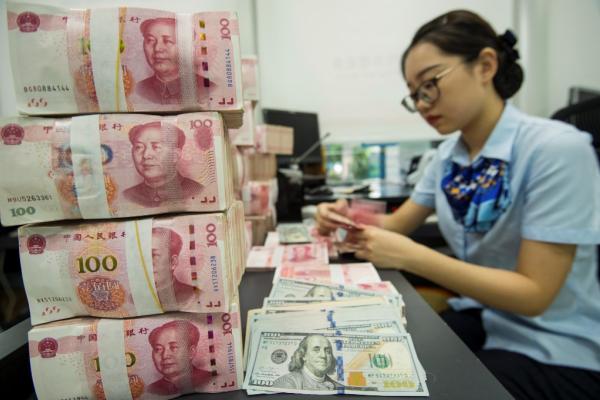Up until August, things were looking up for China. It was among the first nations to overcome the coronavirus crisis, and the country's vital manufacturing sector appeared to be recovering. Then came the GDP growth downgrades amid the Covid-19 Delta variant's Asian rampage, with both Goldman Sachs and ING slashing their China GDP growth forecasts. Now, things have gone from bad to worst as the collapse of the Asian powerhouse's second-largest homebuilder, Evergrande Group, threatens to pile even more pressure on China's already reeling economy.
Evergrande is one of the biggest fish in China's high-yield dollar-denominated bond market, which accounts for 16% of all bonds issued in the country. Unfortunately, it appears as if the construction giant will default on its obligations, with Fitch deeming it "highly likely" and Standard and Poor's calling it "inevitable". Following the revelation of the extent of Evergrande's financial woes, we saw one of the Asian markets' biggest red days of the year so far, with 20 September already being dubbed "Black Monday". The damage wasn't limited to Asia, either. Global stock markets lost more than 2%, crypto fell over 7%, and commodities were down more than 1.5%.
Is this the start of GFC 2.0?
Just last year, worldwide debt rose by $24 trillion to reach $281 trillion or 355% of global GDP. It then increased by another $19 trillion in the first half of 2021 and now totals $300 trillion. Around 31% of this new debt comes from developing markets, with China leading the pack by some margin. Naturally, the impact of Evergrande's collapse on Asia and the contagion effect observed across the global markets have many investors worried that we could be headed for another global financial crisis (GFC). To put things into perspective, Evergrade Group's debts account for 2% of China's total GDP. That's no small sum, to be sure, but we must remember that in 2008-2000, Lehman Brothers' debts were more than double this proportion of US GDP (4.2%). As such, it's certainly comparable but nowhere near the same level of devastation.
China in the shadows
While on the surface, Evergrande's collapse is nowhere near as bad as that of Lehman Brothers, the big concern here is that the company could just be the tip of the iceberg. In China's notorious 'shadow economy', we could soon find out that there are dozens of other major companies in the same position and that party authorities are deliberately concealing the extent of the problem. Add to this the possibility of the natural domino effect that we saw in the noughties, and it could prove all too much for the Chinese authorities to handle. Another specific feature of the Chinese economy — where stock market investment is discouraged among the general population — is the huge private investor bias towards real estate. Indeed, the Chinese real estate market accounts for 28% of China's GDP, and 40% of household wealth is tied up in immovable property.
So, will the PRC be able to contain the crisis?
Between the coronavirus and the risks enumerated above, another wave of economic pain in China is a real possibility. And given how powerful and integrated into the global economy the Asian giant is, a Chinese debt crisis could certainly provoke a worldwide financial market storm. Much will depend on how the PRC's authorities and major world central banks respond. If China doesn't succeed in containing the problem at the domestic level, we could plausibly see contagion across Asia and the wider world.
Naturally, the first to feel the pinch will be China's closest trading partners and commodities-focused economies. After this, we would likely see an outflow of capital from developing markets, followed by large-scale asset sell-offs. Luckily, China's command economy means the country's authorities have far greater power to prevent runaway crashes than, say, the US's Plunge Protection Team and will do everything they can to safeguard the nation's wealth. Thus, we can most definitely expect The People's Bank of China to provide all-you-can-eat liquidity to support the commercial banks that lent to the real estate sector, which should be enough to help them weather the storm.
That said, the Chinese RMB has already been dealt a severe blow by the recent revelations, declining to 6.4817 per US dollar. But if the crisis deepens and China's central bank is forced to inject significant liquidity, the yuan could fall further.
What can investors do?
In their notes to investors, investment firms around the world have indicated that a correction of up to 10-20% from current year highs could be on the cards when all the dust has settled on this. With this in mind, it's highly advisable that market participants start to consider defensive assets and instruments that tend to perform well in times of crises and crashes. In developing markets, local currencies could come under pressure amid capital outflows and commodity price corrections. For this reason, dollar-denominated assets (or even the USDX itself) should be preferred over all others. Those with a higher appetite for risk might also consider taking advantage of the opportunity to sell assets via CFDs, with key Asian indices and commodities likely candidates for potential short sellers.
Trade the news with Libertex
Libertex is a trusted broker with almost 25 years of experience connecting traders to financial markets. We have a wide range of assets that allow you to trade the news no matter which direction you think the markets are headed. For example, if you think this is the beginning of a huge crash and want to maximise your possible gains, you can consider the higher-risk VIX Volatility Index, which rises when traditional assets fall. Or simply consider opening a short position in one of the major world indices. For the more conservative pessimists out there, a solid move could be to move cash out of risky assets into the US Dollar Index (USDX). Finally, don’t forget the flipside to that old market saying: What goes down must also come back up. For instance, you might consider deciding on a percentage decline point at which you’d like to get back into equities/indices and set limit buy orders. Whatever you decide to do, the multi-award-winning Libertex app makes trading a painless, enjoyable experience.






